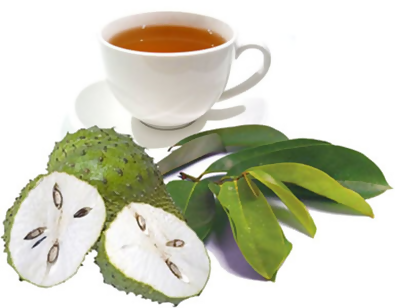
Sep 22 , 2019
0 Comments
Sour Sop Leaves
The Annona Muricata traditionally known as soursop is the largest fruit producing tree of the Annonaceae family and is native to the Caribbean, South and Central American regions. The plant however can be found worldwide in areas that boast a tropical climate. The Jamaican soursop has slight differences from others found in different parts of the world as it is one of the 60 species within the Annonaceae family. The fruit can take varying shapes as it develops but more often than not it is oval, curved or heart shaped. The fruit has a spiny green skin which remains green or just slightly yellow when the fruit is ripe, however if the skin starts changing to a dark brown/black color then the fruit is overripe and on its way to spoiling. At full maturity the soursop tree can grow from anywhere between 15-30 feet even though it takes several years to achieve such heights. In Jamaica the plant can be found in several homes and in abundance especially in rural areas. The fruit can be used in the production of a soursop flavored ice cream as well as in drinks, punches/milkshakes, syrups, sorbets as well as the leaf and bark from the tree being used for making tea.
Research published by the Memorial Sloan Kettering Cancer Center, New York, has purported that extracts from graviola (another name for soursop) when performed on laboratory experiments showed that it is able to fight against cancer cells, herpes as wells as it may prevent certain infections from affecting the body. The belief of soursop particularly being a cancer fighting drug has kept researchers busy and currently research being conducted at the Purdue University, Indiana, has revealed that the soursop plant contains chemicals that are able to kill tumors that had proven resistant to other cancer fighting agents. They further went on to explain that not only was the plant anti-cancerous but it had a special liking for the resistant cells. Sour sop leaves especially are known to help in the fight against the development of bacteria, parasites, viruses and tumors in the body, it also aids in preventing seizures. The control, regulation and prevention of high blood pressure are also vital benefits of soursop leaf.
Soursop leaf tea has been a part of Jamaican tradition for decades and the uses are varied, from the medicinal to just satisfying the urge for a warm cup of tea. In Jamaica, the soursop leave tea is known traditionally to be very good for calming one’s nerves, it is often drank when an individual is preparing for a big event or activity which might bring about a sense of nervousness. It is also commonly believed in Jamaica that the continuous use of this tea will lead to improving one’s demeanour especially in times of stress. The calming nature of this tea will be very helpful to individuals in high pressure environments.
It is also a popular belief that the soursop leaf tea can help toddlers who are still struggling with wetting of the bed as it is said to aid in the toddler’s ability to hold their urine while sleeping. Local herbal doctors have also postulated that sour sop leaf tea is natural medicine to fight against high blood pressure.
There are few ways to preparing the tea and one such way is by boiling the green leaves and sweetening it with either cane sugar or honey. Other ways include allowing the leaves to dry or semi dry depending on preference and then boil the leaves and sweeten. For a more potent cup of tea, the soursop leaf can be merged with cuttings from the bark of the soursop tree which now changes the colour of the tea from brown to a deep red.
Even with the variety of uses of the soursop, the mass of the Jamaican population use the fruit 90% of the time just to make a drink and the leaf for having a cup of tea even without having any ailments or sickness known to be cured by the soursop.
